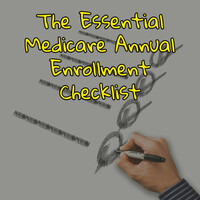
Understanding AEP: A Comprehensive Guide to Annual Enrollment Period
Annual Enrollment Period (AEP) is an important time of the year for Medicare beneficiaries, as it offers a unique opportunity to make changes to their existing health coverage. Choosing the right healthcare options can be overwhelming, and this comprehensive guide aims to shed light on AEP by providing a deep understanding of its purpose, significance, and associated processes. Whether you are new to Medicare or have been enrolled for years, delving into this article will equip you with essential knowledge about AEP and help you navigate through the complexities of enrollment with confidence and informed decision-making.
Understanding the Significance of AEP: Why It Matters
During AEP, Medicare beneficiaries have the unique opportunity to assess their healthcare needs and make necessary adjustments. It provides a designated window each year where individuals can review their existing plans and potentially switch to better options that suit their evolving healthcare requirements. Understanding the importance of AEP allows individuals to stay in control of their coverage decisions by providing an avenue for exploring available alternatives beyond what they might be currently enrolled in.
The significance of AEP also lies in its ability to offer a sense of security and peace of mind. Having access to updated information regarding different plan options during this period ensures that beneficiaries are getting appropriate coverage based on current medical needs. Whether one wants additional benefits or lower premiums, being knowledgeable about how enrollment works during AEP empowers individuals with the tools they need when making significant decisions about their health insurance plans.
Key Dates and Deadlines: Planning Your Enrollment
Annual Enrollment Period (AEP) is a time-sensitive period for Medicare beneficiaries, and understanding key dates and deadlines is crucial to effectively plan your enrollment. The AEP typically runs from October 15th through December 7th each year, providing approximately six weeks for individuals to make important decisions about their healthcare coverage. During this period, participants can review their existing plans, make changes according to their evolving needs, or switch to different options that better suit their requirements.
It's essential to mark these key dates on your calendar in order not to miss out on the opportunity to modify your health coverage during AEP. By October 1st each year, you should receive an Annual Notice of Change (ANOC) from your current insurance provider. These documents outline any modifications made in terms of cost-sharing arrangements, services covered by the plan, or other details relevant to enrollees. Reviewing these notices thoroughly will help you evaluate if your current plan still meets your medical needs and financial preferences.
Another important date within the AEP period is October 15th when enrollment officially begins. This marks the starting point where you can change plans such as Medicare Advantage Plans (Part C), Prescription Drug Plans (Part D) Be sure to compare benefits, costs involved with each option, network coverage area availability(when applicable). Evaluating various choices early allows ample time for researching and gaining insights into what suits you best before making informed decisions about possible changes or staying with your existing plan.
.
Should I try to change my Medigap Plan during AEP?
Medicare beneficiaries have the option to change their Medigap Plan during ANY time of year. You do not need to change plans during AEP. In fact although it can be a good opportunity to reassess your healthcare needs and determine if your current plan is still the best fit for you. But if you are just planning on changing from one Medigap plan to another (not moving to Medicare Advantage), you may want to avoid AEP for making changes to your Medigap plan.
The reason? Unless you live in a state with special rules (such as the Birthday rule), you will still have to go through medical underwriting to make a change to your Medigap plan during AEP. Since most insurance agents who specialize in Medicare are very busy at this time (think accountants during tax season), you will likely get a more relaxed conversation if you make these changes outside of AEP.
But you SHOULD review your Medigap plan every year with your Medicare insurance agent to be sure that your costs are not out of the normal range for someone your age and zip code.
Your health needs may have changed since you initially enrolled in Medicare. It's possible that the coverage provided by your current Medigap Plan no longer aligns with your healthcare requirements. By reviewing other available plans yearly, you can find one that better suits your current situation. Many people do this during their birthday month.
However, it's important to note that changing plans involves careful consideration and research. You should review various factors such as cost, coverage level, provider network availability, and potential out-of-pocket expenses before making a decision. Consulting with an experienced healthcare advisor or an independent insurance agent can help ensure that any changes you make are in line with both short-term goals and long-term health management strategies.
Evaluating Your Current Coverage: Is A Change Necessary?
Evaluating your current coverage during the Annual Enrollment Period (AEP) is an essential step in ensuring that you have the best healthcare options for your needs. This period gives Medicare beneficiaries a chance to review their existing health coverage and make changes if necessary. It's crucial to take advantage of this opportunity, as it allows you to reassess your medical needs and determine whether your current plan is still meeting them effectively.
During AEP, you should evaluate various aspects of your coverage, such as the costs, benefits, networks, and prescription drug coverage offered by different plans. You may find that there are new options available that better suit your needs or deliver more value for money. Additionally, factors like changes in health conditions or medications can influence your need for different types of healthcare services. By carefully evaluating your current coverage during AEP, you can ensure that you have adequate protection and access to the care and medications you require.
Navigating the Enrollment Process: Step-by-Step Guide
If you decide to enroll in a new plan, you'll likely be working with an insurance broker. There is no reason to try to "go it alone" because their services are free to you. They get paid by the insurance company. You'll pay the same whether you go through a broker or go direct with the company. Brokers have an incentive to help you find the plan that works best for you, while captive agents and insurance company employees only have to enroll you in THEIR plan, regardless of whether the plan is the right one for YOU.
Generally you can enroll in person or on the phone. You'll need your Medicare ID card. Additionally, if you are changing Medicare Advantage Plans, you'll want the list of doctors (or other healthcare professionals) that you want to keep. You'll also want your list of medications and the pharmacies you are loyal to.
With this information, your Medicare broker can help you find the plan that works best for you. Once they do that, they'll help you enroll.
During AEP you can make as many changes as you'd like. The last change to hit the system before December 8th is the one that will "stick". After that, you'll be enrolled for the next calendar year.
Tips and Resources for Making Informed Decisions During AEP
Making informed decisions during the Annual Enrollment Period (AEP) is crucial for Medicare beneficiaries. To ensure that you are making the best choices for your healthcare coverage, it is important to gather resources and tips that can help guide your decision-making process. Firstly, familiarize yourself with the available plans and options in your area by utilizing online tools provided by Medicare or contacting a licensed insurance agent who specializes in Medicare. These resources will provide valuable information about plan benefits, costs, and networks of doctors and hospitals.
Another useful tip is to carefully review your current healthcare needs and expenses before making any changes. Consider factors such as prescription drug coverage, doctor visits, specialist services, and hospitalizations. By understanding your specific healthcare requirements, you can select a plan that aligns with your needs while minimizing out-of-pocket costs.
Additionally, seek advice from trusted sources such as family members or friends who have experience navigating AEP. Their insights may offer valuable perspectives on choosing the right plan or insurer based on their own positive experiences or challenges they have encountered.
By gathering relevant resources and following these tips during AEP, you can make well-informed decisions regarding your healthcare coverage to ensure that it meets both your current needs and budgetary constraints.




